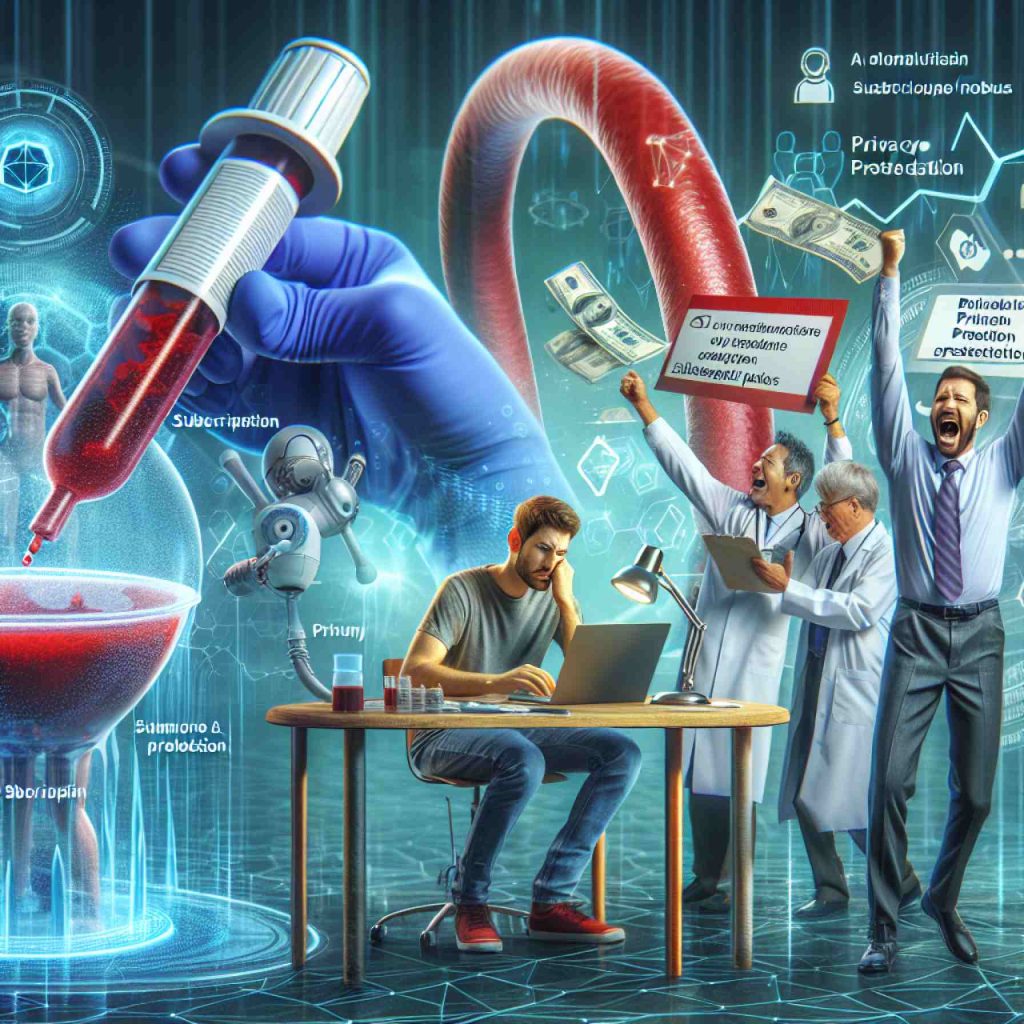
- Billy Evans spearheads Haemanthus, reintroducing blood testing with ambitions of human health optimization amidst echoes of past controversies.
- The Federal Trade Commission delays its “click-to-cancel” rule until July, aiming to simplify subscription cancellations, signaling a potential revolution for consumers.
- Fidji Simo transitions from Instacart to OpenAI, highlighting the increasing alignment of businesses with AI, capturing 32.4% of U.S. enterprise interest.
- Google resolves privacy lawsuits in Texas with a $1.375 billion settlement, showcasing the complex contrast between tech giants and individual privacy rights.
- The PlayStation 5 integrates Apple Pay, enhancing the gaming experience with seamless transactions and potential cashback rewards, boosting Apple’s ecosystem appeal.
The intricate dance of the tech industry twirls once more, luring us into a week brimming with high-stakes plays and budding innovations. Curveballs? Oh, there are plenty.
Picture this: blood testing makes a daring comeback, echoing the infamy of yesteryears with a familiar name at the helm—Billy Evans. As he gathers backing for Haemanthus, the echoes of past controversies tango with ambitious promises of “human health optimization.” Investors, peering through the looking glass of innovation, are cautiously optimistic, yet history compels them to proceed with guarded steps. In a world where every revolutionary tech idea can be a Trojan horse, the narrative of Haemanthus carries the weight of both hope and skepticism.
Meanwhile, the Federal Trade Commission teeters on the verge of significant consumer revolution, pausing with its much-hyped “click-to-cancel” rule until July. Promising subscribers a seamless exit route as easy as the enticing entry—a feat that often feels like hacking through an enchanted forest—this rule aims to dismantle the labyrinthine paths often associated with cancellations. Yet, telecom giants watch with the wariness of an alley cat cornered by a garden hose.
The corporate carousel spins faster as Fidji Simo shifts from steering grocery goliath Instacart to leading OpenAI as CEO for Applications. Her journey from the grocery aisles to the forefront of generative AI emphasizes a growing trend: businesses are rapidly aligning with AI titans like OpenAI, which already seizes the wallets of 32.4% of U.S. enterprises. As businesses lean into AI, the promise of streamlined operations and innovations that were once the purview of science fiction now teem with reality.
Over in Texas, Google greets a courtroom grievance with a $1.375 billion settlement, gently placating privacy lawsuits as deep pockets extend a subtle, yet effective olive branch. The formidable giant—synonymous with search and sovereignty—finds its privacy practices under fire, yet emerges relatively unscathed. Here, the lines of privacy protection blur as legal verdicts contrast the grandiosity of tech empires with the quiet rights of the everyday user.
Gamers rejoice as the PlayStation 5, a cherished treasure for many, harmonizes with Apple Pay. A seamless symphony of convenience and technology unfolds as frictions dissolve and Apple’s ecosystem grows even more entrenched within consumer habits. With whispers of cashback rewards enhancing the allure, the digital age embraces a new form of gamer indulgence, blending ease with incentive.
Concluding this week’s tech saga, one ponders: does the industry serve as a soothing lullaby or a looping rollercoaster? A delicate balance exists between innovation and upheaval, promising us a future where technology enlightens rather than overwhelms. Here’s to embracing each twist with curiosity and keeping morale as charged as our devices. In tech’s grand play, let innovation act as our guide, not the conductor of chaos.
The Tech World’s Latest Innovations and Tensions: What You Need to Know
The Return of Blood Testing Tech: Lessons from the Past
Billy Evans’ re-entry into the blood testing arena with his venture, Haemanthus, raises familiar questions among investors about technology’s potential pitfalls. This move echoes past controversies around startups like Theranos, making investors and experts wary. However, the focus on “human health optimization” suggests a broader application of blood testing technologies aimed at preventative healthcare and personalized medicine.
Real-World Use Cases:
– Preventative Health Monitoring: Regular blood tests can aid in early detection of diseases such as diabetes, hypertension, and various cancers.
– Personalized Medicine: Tailoring treatment plans based on specific biomarkers found in a patient’s blood.
Market Forecasts & Industry Trends:
– Growth in Blood Testing Market: According to Grand View Research, the blood testing market size is expected to reach USD 86 billion by 2027, driven by technological advancements and increased awareness about preventive care.
FTC’s “Click-to-Cancel” Rule: A New Dawn for Consumer Rights
The proposed “click-to-cancel” rule by the Federal Trade Commission represents a significant potential shift in consumer rights, aiming to simplify subscription cancellations. This could set a precedent for other regulatory bodies worldwide, promoting transparency and fairness in consumer tech interactions.
Controversies & Limitations:
– Resistance from Telecom Giants: Major telecom companies argue that the rule could lead to a loss of revenue and could complicate customer management.
– Implementation Challenges: Companies may face logistical hurdles in revamping their cancellation processes.
AI’s Expanding Influence: From Groceries to Global Tech
Fidji Simo’s transition from Instacart to OpenAI exemplifies the fast-paced integration of AI into various business sectors. The adoption of AI is no longer limited to tech companies but spans multiple industries, promising improved efficiencies and innovative customer experiences.
Features, Specs & Pricing:
– AI Utilization in Business: Businesses leverage AI for tasks ranging from inventory management to customer service automation.
– Cost Effectiveness: AI-driven automation can reduce operational costs by 15-30% according to McKinsey & Company.
Google’s Privacy Settlement: A Case Study in Corporate Strategy
Google’s $1.375 billion settlement in response to privacy lawsuits showcases the complexities of balancing corporate interests and consumer privacy rights. This settlement highlights the importance of robust data protection strategies in tech companies, reinforcing the need for strict compliance with privacy laws.
Security & Sustainability:
– Data Protection Measures: Companies are investing more in encryption and data protection solutions to avoid future legal issues.
– Sustainable Privacy Practices: Advocating for policies that ensure long-term data security without impeding technological growth.
PlayStation 5 and Apple Pay: The Future of Seamless Transactions
The integration of Apple Pay with PlayStation 5 indicates a growing trend of seamless payment systems within the gaming industry. This move not only simplifies transactions but could also revolutionize in-game purchasing and motivate further adoption of digital wallets.
Pros & Cons Overview:
– Pros: Enhanced user experience with faster transactions and potential cashback offers.
– Cons: Risk of data breaches if proper security measures are not implemented.
Reviews & Comparisons:
– Consumer Feedback: Users generally express satisfaction with the convenience of using Apple Pay, highlighting its speed and ease of use compared to traditional methods.
Conclusion: Staying Ahead in the Tech Industry
As technology continues to evolve, businesses and consumers alike must adapt to rapid changes while being mindful of potential challenges. To thrive in this dynamic landscape, consider the following tips:
– Stay Informed: Keep up-to-date with the latest industry trends and regulations to anticipate and prepare for changes.
– Leverage AI Wisely: Identify areas within your business where AI can provide the most value and enhance efficiency.
– Prioritize Privacy: Implement robust data protection policies to build consumer trust and avoid legal repercussions.
For more insights into the ever-evolving world of technology, visit the FTC, OpenAI, and Apple.



